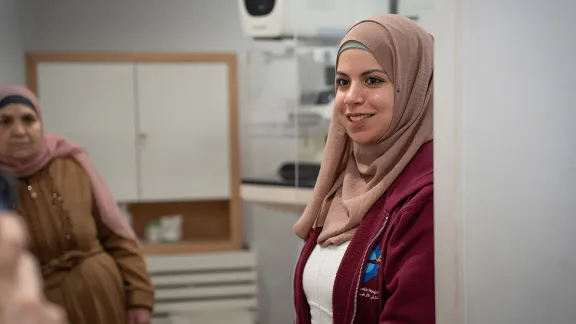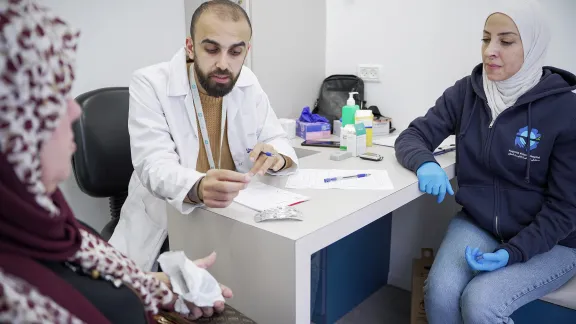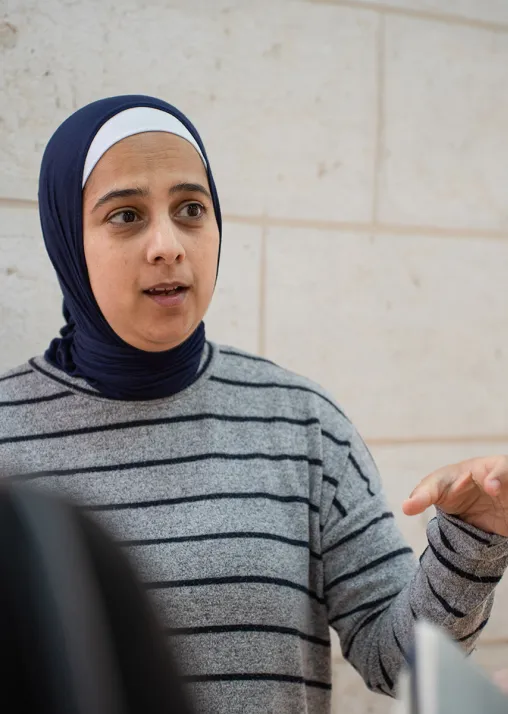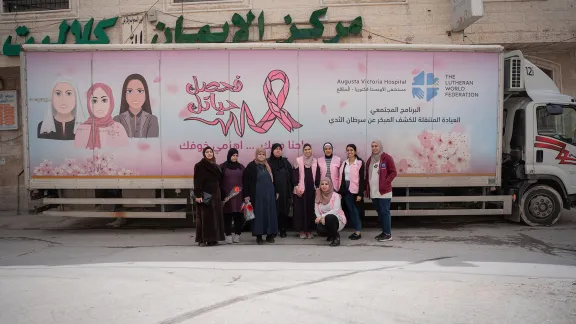With mobile clinics for detecting breast cancer and managing diabetes, the Augusta Victoria Hospital brings quality health care closer to people in the West Bank. Its advantage: trust and close relationships with the patients; its biggest challenges: poverty and the Israel-Palestine conflict.

Narmeen Awwad, radiation technician, during consultation at the "Pink Bus", a mobile mammography unit dispatched from the LWF Augusta Victoria-Hospital (AVH) in East Jerusalem. Photo: LWF/ Abdalla Elayyan
"Pink Bus" mammography unit and Diabetes bus care for remote communities
(LWI)—The Pink Bus for mammography and a diabetes bus. These have become well known features of the community outreach program of the Augusta-Victoria Hospital (AVH) in East Jerusalem. The Lutheran World Federation (LWF)-run hospital aims to bring health care closer to Palestinians. AVH regularly sends two mobile units into the Palestinian Territories: As Palestinians in the West Bank and Gaza ' movement is severely restricted by checkpoints and the Separation Wall, having access to quality care can significantly improve their health.
"People trust us"
The Pink Bus, which offers breast cancer examination free of charge, is the older of the two. Established in 2009, it was upgraded to a new digital mobile mammography clinic in October 2020, and served 5,622 women in 2023. As AVH specializes in oncology, the outreach unit was created to raise awareness and encourage women to have mammographies regularly.
"It's my third exam," says Najah Ajlouni, a resident of Anata in East Jerusalem. People who live here are Palestinians with an Israeli identity card. The mother of five adult children has a family history of cancer. "I used to do my checks in Sheikh Jarrah, but it is very crowded there."
People here feel like they can trust us.
Lana NASSER EDDIN, Chief Community Outreach Program
Women older than 40 are given mammography exams. Younger women are shown how to self-examine their breasts, and any detected cases are directly transmitted to the oncology unit at AVH for diagnosis. There are around 25 women who do the exam in a day. In 2023, the unit diagnosed 27 cases of breast cancer, all in early stages, which often signifies a good prognosis for treatment. "People here feel like they can trust us," says Lana Nasser Eddin, the director of the community outreach program. "Some even say: No one cares about us but you."
The bus visits are announced to communities by AVH and sometimes health clinics make a request, so that patients can book appointments in advance. But the program does not stop here: Eddin and her colleagues regularly visit communities to explain the exam and raise awareness. "The more educated the women are, the easier it is to convince them to do the exam," she says. “We also work with remote Bedouin communities. This takes several pre-visits."

Dr Maen Hay Ahmed (center) and nurse Reena Abu Sneineh (right) during consultation in the mobile diabetes unit. Photo: LWF/ Abdalla Elayyan
Diabetes and Ramadan
The close connection between the medical team and potential patients all over the West Bank is also key to the success of the mobile diabetes unit. In 2023, it served almost 5,000 patients. Nowadays, the bus is stationed in a small village in Bethlehem district. AVH doctors and nurses examine feet and screen eyes. Many patients are elderly and only seek treatment when their feet go numb, or their vision begins to blur.
"We will have to come back; these are all uncontrolled cases of diabetes," says Dr Maen Haj Ahmed, who recently joined the team. "Diabetes is a big problem in Palestine," Eddin adds. "Many patients come with very high blood sugar. They eat poor diets, do not exercise regularly, and take no or the wrong medication."
Unlike local clinics that may provide limited instructions, the AVH mobile team takes a comprehensive approach, educating patients on nutrition, sugar avoidance, and medication management. They also offer guidance during the Muslim holy month of Ramadan, advising patients on fasting practices and necessary adjustments.
The patients trust the team, and generally follow their advice – like Jamileh Fanoun, a 65-year-old woman. “I walk 20 minutes every day,” she proudly says, explaining in detail how she made dietary changes and now embraces healthier cooking practices. She learned about the mobile unit through social media and now diligently follows the advice of the diabetes team.

Lana Naser El Den, director of the Community Outreach Program. Photo: LWF/ Abdalla Elayyan
A systemic problem
The prevalence of diabetes in the West Bank is not merely a medical issue but it also reflects broader socio-economic realities. Limited healthcare resources, exacerbated by the recent conflict, hinder effective diabetes management: Mohammed, 49, and his son lost their jobs on an Israeli construction site in October after the Hamas attack. Mohammed used to buy the specialized medication he needed from his salary, but now he barely knows how to put food on the table. Other patients walk in simple plastic sandals, an elderly patient’s walking stick looks like it has been repaired several times.

Team and patients in front of the “Pink Bus” is East Jerusalem. Photo: LWF/ Abdalla Elayyan
Addressing diabetes in the West Bank is not just a medical intervention but takes a holistic approach. Apart from considering cultural issues like fasting during Ramadan, the bus also works with local clinics. The Ministry of Health, responsible for providing medication to diabetes patients, faces capacity constraints, often resulting in insufficient support and guidance. The mobile unit, therefore, also trains local nurses.
Some issues, however, are beyond their control. "I can avoid soft drinks, but I cannot avoid stress," Marwan (49, name changed) says. He then talks about the olive grove that his family owned. In October 2023, the military occupied the land and cut down the trees – an additional livelihood lost to his family.
"We want to feel safe. We want peace," he says.


